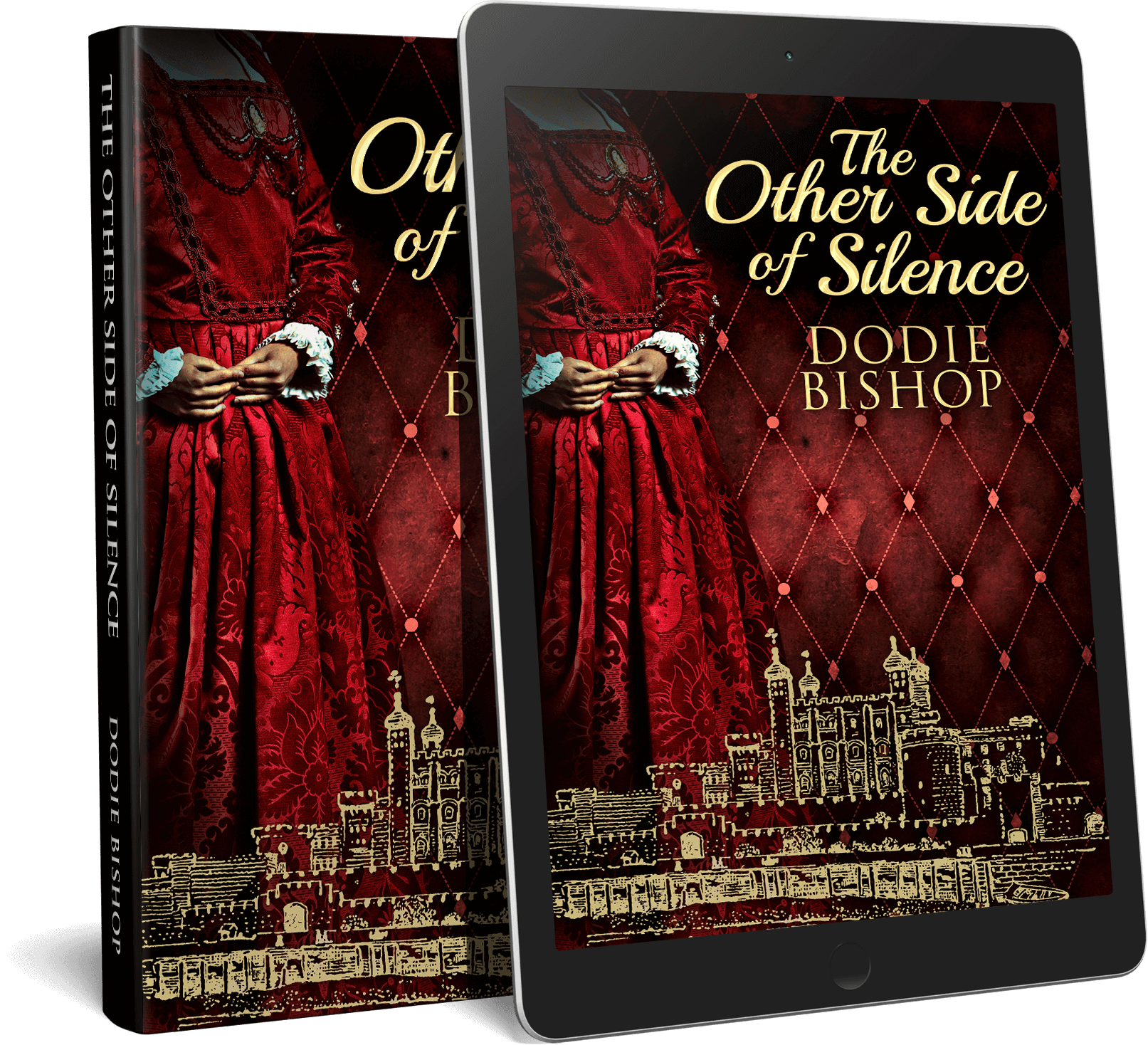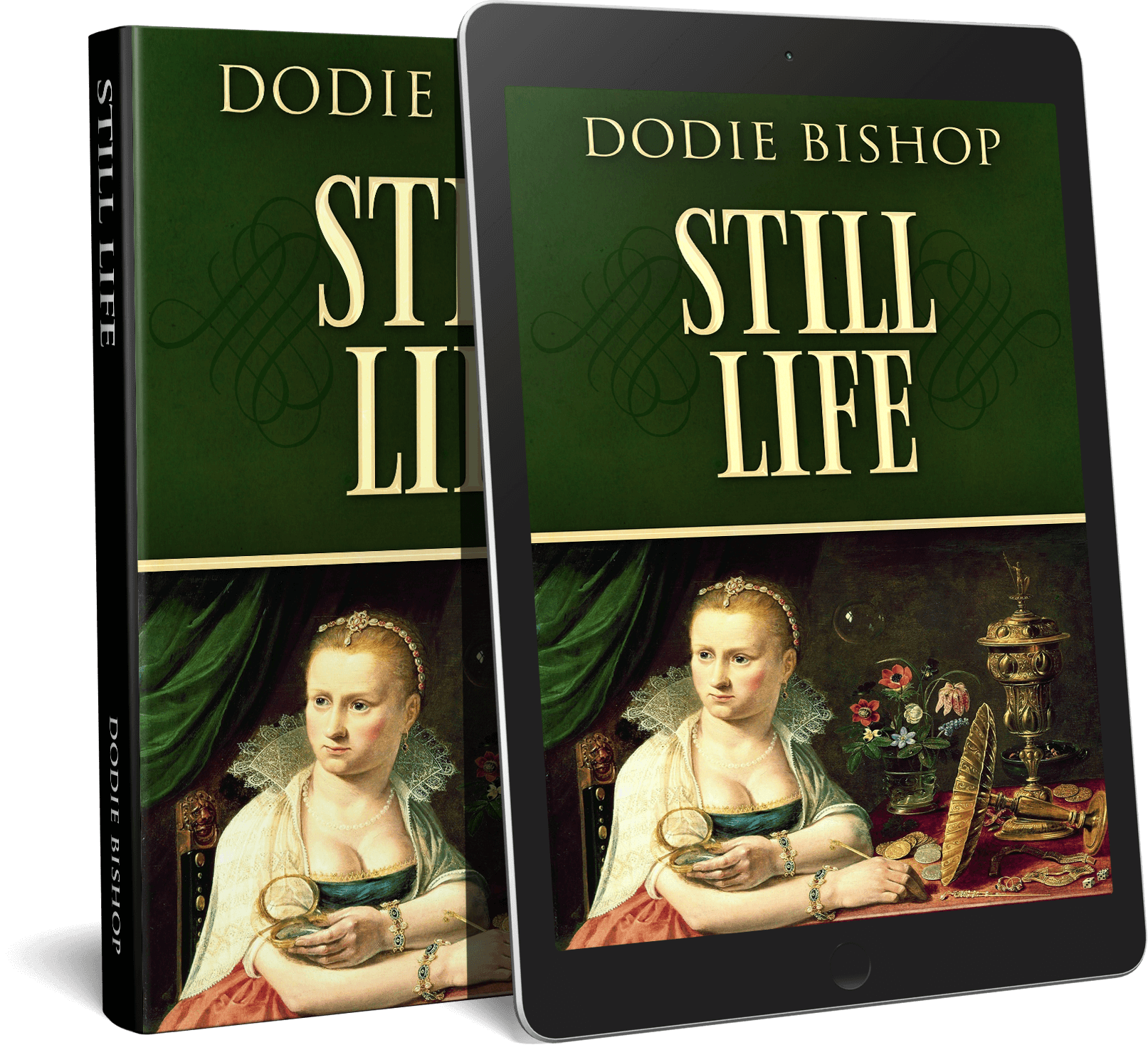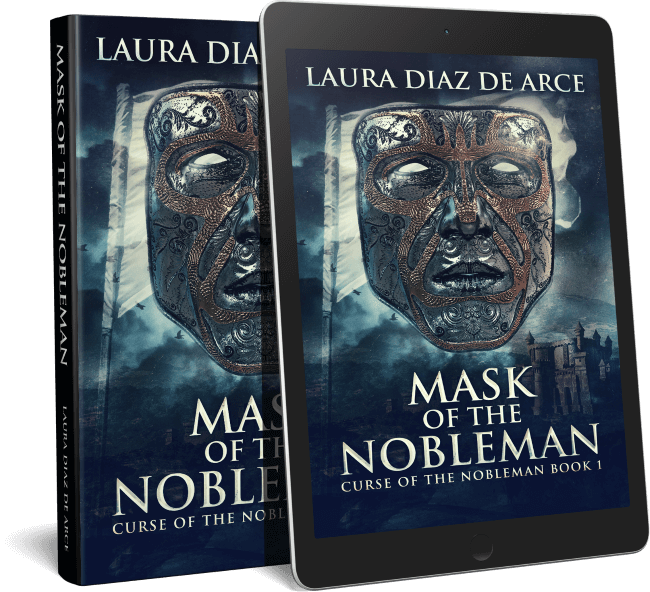The Other Side Of Silence
The Other Side Of Silence - book excerpt
Chapter One
Susannah
Might it be possible? Sitting at the battered walnut desk in my Henrietta Street bedchamber surrounded by so much that is familiar and dear to me, I begin to hope. Can I not draw strength from it, somehow? The bed with its sage green velvet drapes. My first good watercolours lovingly framed upon the walls. Papa’s small portrait of Mama. My gaze halts there, wishing she was with me still, so none of it would have happened.
From the window, the sky is a sharp winter blue above the only London home I have ever known. My fingers trace the constellation of nicks and scratches on the desktop, familiar with them as with keys to play a tune. Placed in the centre is a book bound in fine brown calfskin with intricate gilded tracery at each of its corners. On the frontispiece I have already written Susannah Gresham. A coal shifts on the fire, startling me from my musings. I open the book, but still I hesitate. Why? I dip my pen with a sigh, staring at the blank page, its very blankness seeming a reproof. How can it feel such a huge thing to make this first tiny stroke? Have I the courage? I make a mark. The ink blots, but I have begun.
Diary: November 25, 1675
I write this journal because I am about to move back into my life and wish to record it so perhaps my journey may be eased by seeing evidence of the steps I manage each day. All forward ones I pray. I refuse to countenance failure when there has already been too much. For I am trapped and must find a way to escape. And, yes, I do laugh at myself because of it occasionally, albeit in a mocking sort of way. For how can I not when my predicament is entirely of my own making?
I must admit here that I am quite cravenly afraid, for this day is not one I saw coming. Or not yet. Nowhere near yet, in truth. But is it not better this way when I would have hidden from it if I could? I gasp a breath and straighten my back. Today I shall steel myself to return to Whitehall Palace again for the first time in three years and present myself to my Godfather, the King.
Papa has shown him some of my new miniatures – another step back to who I was – and they have pleased him, so he has commissions for me. A slight narrowing of his eyes told Papa – who is his friend of many years – he had seen through my ruse. Few do. For whom would not believe themselves a little younger or comelier or indeed more manly. Many have come to Henrietta Street to view their finished miniature and left with maybe a greater sense of self-worth if not heightened vanity. All this while I imprisoned myself here.
The church bells sound in St Paul’s in Bedford Street and now, God help me, it is time to leave.
Returned at last to my bedchamber, I compose myself before taking up my pen to write by candlelight. I must note first that I am truly proud of myself for only I know what this day cost me.
It began with a musical performance in the Banqueting House. Ranks of fluted marble columns soared. Rubens’ exquisite, panelled ceiling dazzled. Heavy glittering chandeliers plunged, luminous with candles. I tried at least to appreciate the beauty of it all again, but it was difficult. I walked in on my father’s arm, assailed by a miasma of perfume and raucous voices, wishing myself invisible though perhaps James and Catherine’s flamboyant dress meant I was to no little extent. Papa squeezed my arm with his to reassure me while I tried to maintain my usual detached expression, despite my loathing of any enforced time in the company of my stepmother and her son. Though it was not that, was it? I was not detached, of course, but rather sick with anxiety to be at the palace again. I must bring truth to this or what purpose will it serve?
I found the performance of Carissimi’s Jephte heartbreakingly beautiful, though the constant chatter from the audience was unsettling. It was a reminder of what I most disliked about the court. The shallowness of it all. I saw the King seated at the front before the dais between his brother and his son, all three splendid in scarlet satin and gold lace. His head often tipped towards Monmouth, discussing the performance I hoped, for had he not commanded it? His brother’s eyes were closed though, his chin threatening to fall to his chest until his duchess touched his arm, for he is known to lack Charles’s eclectic tastes and would far rather be racing him on horseback at Newmarket.
In truth, I was much relieved when it was over, and I could attend the King at the privy apartments close beside the river. Though I approached the closet where I might swop my mantua for a painter’s smock with some caution, knocking and opening the door but a crack to make sure it was unoccupied. Last time I had done so only to be confronted by the sight of a naked male posterior thrusting between a lady’s thighs upon the sofa. I shuddered at the recollection, thankful that on this occasion it was empty, allowing me to change and collect my painter’s box and easel needed for my work.
How thin and pale was my reflection in the mirror … as Catherine never failed to point out to me. I blinked back tears, needing my mother just as much then as I had ever done. I could scarce believe it three years since her death and for each one, I have hidden away. Can I admit here how much it has been in anger? I must, of course. And how much I now despise myself for it.
The King’s rooms were more lavish than when last I saw them as was one of his long-standing mistresses whom I am to paint. Though I had heard tell of his spectacular silver furniture, I was not quite prepared for its startling presence or indeed its abundance. I gazed at a console table embossed with tulips and scrolling acanthus leaves, his crowned cypher chased at its centre. On either side were matching candelabra stands, with a mirror above to reflect the light. Jesu. This lavish place felt … outlandish. I took a deep breath in air heavy with a cloyingly sweet floral perfume, though its taste was bitter on my tongue.
Lady Castlemaine, Duchess of Cleveland, was to be painted sitting beside her son whom on reaching thirteen years, had been made Duke of Southampton by his father the King. How vexed my stepmother is that, though her first husband was a Villiers, he was but a distant kinsman to this one. Our lives might have been very different now should he have had closer connections. My poor papa would surely have escaped her clutches as a means of getting to court. My heart pounds with indignation for all the good it does.
After watching me begin my work and praising both his mistress and his son for their poise as sitters, the King turned to me. ‘Why, Susannah, do you no longer speak? We remember you had plenty to say for yourself the last time you were here. What can have brought about such a reversal?’
I shook my head and looked to my brush, horrified by his sudden interest. This was why I had stayed away. These were questions I had no answers for. I chew my lip as I write. If any man has the look and stature of a King, it is he. Everything about his person exudes power and entitlement. He terrified me.
He sighed his vexation. ‘What then if we should command it of you?’
Why in the name of Jesu had I gone there when I knew he would challenge me? Not brave, merely reckless. I put down my brush, lifting the notebook I kept tied on a girdle at my waist, and with trembling fingers scrawled, ‘Your Majesty. I cannot. It is not in my control.’
‘But your father tells me you have had no injury or illness to bring about such an enduring deficiency.’
I clenched my jaw and scribbled, ‘I cannot explain it, Sire.’ How abjectly feeble, as I knew how very much he despised such weakness. When his eyes narrowed, I feared his temper was about to erupt. I had witnessed it once as a girl and never forgotten it. Papa, and others often at court, tell me it is now a more regular occurrence. The line between his fierce brows deepened, like an arrow pointing to his mighty nose. I held my breath, my stomach clenching at the prospect of his rage now directed at me.
Then, he smiled and shook his head, tweaking my cheek with his big fingers. ‘A woman’s mind is ever a mystery for want of male reason, if nothing else … and we wouldn’t have it different. We shall leave you to your task.’ With a nod to Castlemaine and Southampton, he left the chamber trailed by his usual retinue. They seemed very little changed in the years I had been away. I pretended not to hear the sniggers from some fine examples of male reason as they passed by.
After breathing deeply for some moments to gather myself, I looked to my work again, standing resolutely at my easel until I had sufficient completed in watercolour to copy with enamel onto precious metal in Papa’s studio. Castlemaine’s cream satin and crimson mantua contrasted well with her son’s indigo velvet and would be helpful to the portrait’s colour balance. She was gracious when I told her we were done. Her boy had fallen asleep, his chin down upon his chest, and she woke him with impatient hands before coming to look at my work.
‘You will make much of my fine white skin.’ She touched her face more gently than she had her son.
I knew she thought of her younger rival, the Duchess of Richmond, whose face bore some ravages of smallpox, though without leaving her sufficiently disfigured to deter the King’s affections. They all seemed so jaded for such activities. I shuddered at the thought of all that flesh released from its bejewelled encasements. Though such indulgent abandon befitted those rooms entirely.
Back in the Henrietta Street studio, soothed by aromas of hot metal and firing enamel, I became myself again, my racing heart slowing, and my breathing eased. Rows of worktables and shelves of metal oxides. Jars of powdered glass in vibrant colours beside flagons of amber oil. And key to it all, the kiln where we performed our alchemy. Everyone was busy and no one looked up at my arrival. Good.
Assessing my composition placed down on my table, I was surprised at its fluency despite my unease while painting it. Then, using my lens, I began applying my first colour paste – prepared by Papa’s assistant, Edmund, without need to ask – to the gleaming gold disc. I sighed my relief. Yes, this studio had become my refuge. Too much so, I knew. It had become my hiding place. And, finally, my prison. Had I not withdrawn within myself, too, by not speaking?
The more I had thought of my predicament the more it alarmed me, for it would rob me of my life if I allowed it. So eventually, when one fear sufficiently outweighed the other, I went outside. I sighed again, knowing it was now time to address my silence, which meant confronting the why of it, and with some honesty at last.
When the longcase clock chimed four, echoed as always by the bells of St Paul’s in Bedford Street, I put away my work and took off my smock before running downstairs to the receiving hall and tugging the bell pull to summon my maidservant. I hastily wrote on my pad, telling her I would go in her stead to Whitehall to fetch Penny home. She was visiting her friend whose parents had rooms off Wood Yard far from the King’s where I had been earlier. I am truly determined to make myself go out whenever I can and here was another opportunity. I hope the more I do so the easier it will become, though it is far from that yet.
Bess had Papa’s town coach sent round and I hurried to it in light already fading into evening, though the street was still lively with traffic. Coal smoke rose from every chimney to shroud the twilight and taint the air with its acrid odour. Inside, I pulled a rug over my knees for even through my fur-lined cloak, the air was chill.
Sam would soon be home from the French court, where he has been these last many months, and I longed for him in a way that almost overwhelmed me for I have known him my whole life. Loved him my whole life, and it felt a part of me was missing without him. ‘Sam.’ My breath misted the air in front of me. Yes, I can speak, though he is the only one to hear me now. And unbroken silence for so long has taken its toll upon me. So, this damnable thing must end, but I shall need his help to do it. Yet I laugh as I write. Why? Because he really should turn his back on me; I am so burdensome to him. He is too honourable to do it, of course.
It had begun when I lost my mother to the sweating sickness – well in the morning, dead by dark. Felled by shock and grief … and then impotent rage at her loss, my voice had truly deserted me for a time. I was twenty. Penny but four. I remember how powerless I felt, and silence gave me a sense of agency when it became something I could control. How glad I was for it, too, when Papa married Catherine Villiers just two months after her death. I used it to hurt then … and do still … so fittingly damaging myself most of all. Can Papa ever forgive me? For I know it must end now. And I must start by talking to him. Might it be that Sam’s prolonged absence has taught me a salutary lesson by opening my eyes to just how much I too need the easy chatter not possible with pencil and paper?
Penny was ready for me at the Foyles’ lodgings. I wrapped her in her own warm cloak and kissed her; she was so happy to see me when she had expected Bess. I smiled at her excitement wishing I could speak to her. What madness that I cannot.
As we crossed that icy court an odd young man came into view, appearing to dress himself as he walked. On hearing our approach, he looked up with such a strange expression on his swarthy face, I was quite unnerved. As I walked away towards King Street and my coach, Penny tugged at my hand.
‘A pretty man.’
I have never felt so brittle, as though one sharp blow would shatter me. I exhale, allowing fatigue to sweep over me for it can never be this arduous again. Can it?















Praesent id libero id metus varius consectetur ac eget diam. Nulla felis nunc, consequat laoreet lacus id.